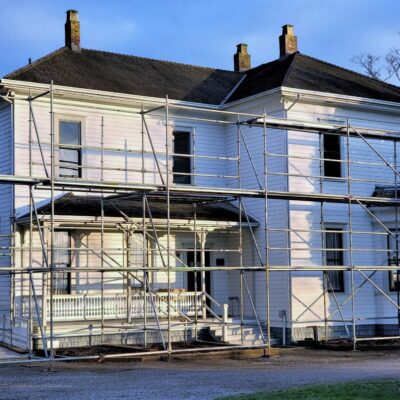Mortgage Field Services: A way to diversify and prepare for retirement
Last Updated November 27, 2023

You perform your inspection. Your clients negotiate with the sellers and land on a price. Just a few weeks later, your clients are moving into their new home. Happily ever after, right?
Not always. Sometimes, homeowners can’t make their loan payments. And when their loans default, the bank may send someone out to confirm that the property is unoccupied and properly maintained. That someone could be you should you decide to offer mortgage field services.
Why Home Inspectors Offer Mortgage Field Services
According to the National Association of Mortgage Field Services (NAMFS), mortgage field services are the inspection, preservation, and repair of properties—primarily those with delinquent or defaulted mortgages. (Keep in mind that your insurance company may want you to stay away from the repairs side of things. More on that later.)
During a field inspection, inspectors visit the property, take photos, and submit a brief report to the financial institution, detailing the limited information they’ve been asked to collect. Many inspectors refer to field inspections as “drive-by” inspections since they take about 10 minutes to complete. According to NAMFS, inspectors can earn about $15-$30 per field inspection.
When asked why they offer mortgage field services, the home inspectors we interviewed gave the following reasons:
 1. They wanted to diversify their business.
1. They wanted to diversify their business.
With the economy always changing, Steve Jenicek of TaskMaster Home Inspections in Montana says that mortgage field services can offer inspectors some stability.
“I started doing field inspections to stay alive during the market downturn [from] ’07 to ’09,” Jenicek said. “In Montana, diversification is key to staying financially stable during a downturn. I have found that when housing goes down, banks get nervous and [other services, like field inspections and] flooring audits go up.”
According to NAMFS Executive Director Eric Miller, the sheer number of jobs available to inspectors makes mortgage field services a good way to expand their businesses.
“Typically, one to two percent of all mortgages are in some stage of delinquency, which is a significant volume of properties,” Miller said.
2. They wanted to prepare for retirement.
Not everyone can or wants to quit working altogether when they retire. For Peter Pitts of On Site Inspections in Ohio, mortgage field services provide a flexible source of revenue and fulfillment without the physical and time demands of a standard home inspection.
“I started [offering mortgage field services] about 17 years ago [because I] wanted to start something for my retirement years,” Pitts said.
Mortgage Field Services Investments Inspectors Make
Education, Licensing, and Equipment
Unlike most ancillary services, mortgage field services require very little investment. To become a field inspector, you don’t need any formal education, certification, or licensing. If, however, you prefer to have some training before you start, organizations like NAMFS offer courses on best practices and compliance.
While you don’t need to get a license to offer field inspections, you may need licenses in related lines of work to complete certain jobs. Check your state and local regulations to make sure you keep in compliance.
Regarding equipment, most inspectors only need a mode of transportation, a digital camera, and access to a proprietary mobile application or work order software platform, as determined by your client. Some providers base their software prices on the number of inspections you complete while others charge a monthly fee.
Endorsements
An endorsement is a form that either modifies or adds coverage to your insurance policy. Most home inspection insurance policies exclude additional services like mortgage field services. Thus, the insurance company will not offer coverage for those additional services without an endorsement. So, if you perform field inspections or want defense and indemnity for claims involving mortgage field services, you may wish to change an existing policy exclusion with an endorsement. Typically, insurers charge a flat, annual fee around $50 for a mortgage field services endorsement.
Limiting Your Liability Against Field Inspection-Related Claims
Carrying an endorsement is one of the most important things you can do to protect against field inspection-related claims. However, there are additional risk management techniques you can employ to safeguard your business.
Due to the limited nature of field inspections, and because field inspections are for institutions rather than consumers, it is less likely that mortgage field services will lead to errors and omissions (E&O) claims. Rather, it is more likely that inspectors will cause property damage or bodily harm during their inspection, resulting in a general liability (GL) claim. Find some suggestions on how to avoid such GL claims during field inspections below.
 Get a signed agreement.
Get a signed agreement.
Even when you do multiple field inspections for the same institution, you still need to obtain a signed agreement with that institution. Most home inspector insurance providers require signed contracts to provide coverage for related claims. Furthermore, agreements are your primary protection when claims do arise.
However, unlike with typical residential inspections, which require a separate contract for each property you inspect, your insurance provider may allow you to obtain one “master” agreement with the bank or financial institution for which you are providing field inspections. This master agreement may include many of the provisions that characterize your standard pre-inspection agreement—like a limitation of liability and a notice requirement—but caters to multiple limited inspections. To find out if your insurance provider accepts master agreements for mortgage field services, contact them directly.
Don’t go beyond the scope of your inspection.
Be sure to stay within the parameters of your field inspection as outlined in your agreement. From a home inspection insurance provider’s perspective, mortgage field services do not include repairs, building, remodeling, construction, or any type of onsite work. However, most insurance providers permit you to secure the premises with a basic lock or key change. To determine what your policy does and doesn’t cover, review your insurance endorsement.
Alert your clients of potential hazards.
During your inspection, do you notice water running? Is the heating off in the middle of the winter—making it more likely that pipes may burst after you leave? If you notice something that could result in property damage after you leave, be sure to inform your client.
Don’t do anything unsafe to you or others.
If areas of the property appear to be unsafe, stop. If circumstances inhibit your ability to inspect without risk of damaging property or person, stop. Alert your client of the conditions preventing you from doing your job and schedule a time to revisit the property when it’s safe.
Mortgage Field Services and Home Inspectors
Are you looking to diversify your home inspection business? Do you want to less demanding service you can offer in your retirement years?
If you answered “yes” to either of these questions, perhaps it’s time for your company to offer mortgage field services.
This article was published in the ASHI Reporter in June 2021. See how this story appears in print below.






